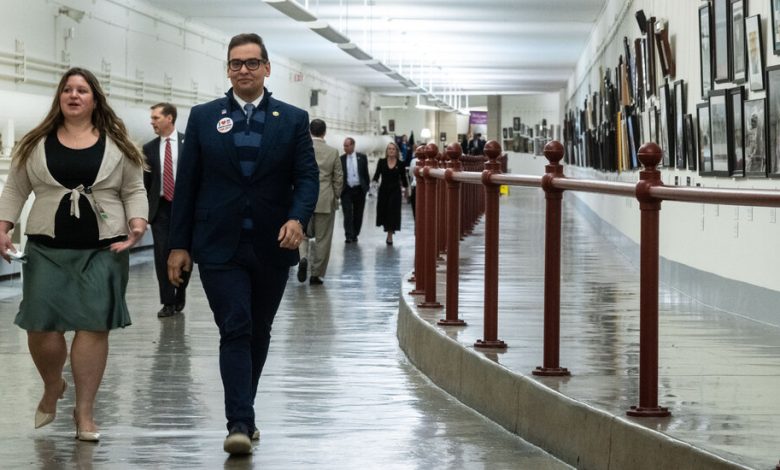Santos Tries a New Tack in Washington: He Introduces a Bill

Representative George Santos has had a hard time making new friends or winning support in his first few months in Congress — an understandable outcome, perhaps, given the post-election revelations that he lied about much of his background.
On Tuesday, Mr. Santos tried a new tactic: He introduced his first bill, seeking to partially undo President Donald J. Trump’s tax plan that limited how much homeowners could deduct in state and local property taxes.
The bill places Mr. Santos, a Republican of New York, at odds with some in his own party. But Mr. Santos is not exactly one of the party’s favorites, and he seemed more interested in currying favor with his constituents, whose high property taxes make them disproportionately affected by the limits to the so-called SALT deduction.
“Raising the cap on SALT will provide real tax relief not just to New York’s Third Congressional District but to all,” Mr. Santos said in a statement released by his office on Tuesday.
The bill is the latest indication of Mr. Santos’s commitment to press on as a congressman, hoping to rehabilitate his public persona while staving off calls for his resignation, even as recent polling has shown that he is viewed unfavorably by 83 percent of voters.
More on George Santos
- House Committees: Representative George Santos said that he would temporarily recuse himself from sitting on congressional committees as he faces multiple investigations over his lies.
- An Expunged Charge: Mr. Santos was able to get a criminal theft charge dismissed and then expunged in 2017. The circumstances of the case — centering on bad checks and puppies — hew closely to other dubious episodes in his history.
- Marriage to Brazilian Woman: A letter to ethics watchdogs in the House of Representatives questioned if Mr. Santos’s seven-year marriage was a scheme to aid a woman’s immigration bid.
- Divisions on Display: A tense run-in between Senator Mitt Romney of Utah and Mr. Santos at the State of the Union encapsulates broader tensions inside the Republican Party.
It has not been an easy path for Mr. Santos, who was forced to remove himself from his two committee assignments pending the conclusion of investigations into his personal and campaign finances.
His work in the House so far has been largely limited to saber-rattling on Twitter and delivering speeches before a mostly empty House chamber on topics ranging from Iran to Holocaust Remembrance Day. (Mr. Santos has falsely claimed that his grandparents escaped the Holocaust).
Even so, the manner in which Mr. Santos’s legislation, which he calls the SALT Relief Act, was introduced underscores the first-term congressman’s isolation: A fellow New York Republican congressman, Nick LaLota, told Bloomberg News that he will not support the bill because Mr. Santos is behind it.
Mr. Santos’s bill also hews similarly to a bipartisan proposal announced in January by Representative Mikie Sherrill, Democrat of New Jersey, and Michael Lawler, Republican of New York, that would raise the cap to $100,000 for individuals and $200,000 for married couples.
Mr. Santos’s bill would raise the cap from $10,000 to $50,000 for single filers. When asked why he had opted to put forth his own bill, rather than support the proposal put forth by his colleagues, a spokeswoman did not immediately respond to a request for comment.
Congressional Republicans are divided on how to respond to Mr. Santos. Leadership, aware that a Santos resignation would mean a special election in a competitive district, has sought to minimize the fallout of reporting on his misdeeds, including campaign finance issues and a pending criminal charge in Brazil.
But New York Republicans — particularly those on Long Island — have been some of his sharpest critics and among the first to call for his resignation.
Last week, Representative Anthony D’Esposito, who represents New York’s Fourth Congressional District on Long Island, announced that he intends to introduce legislation that would prohibit lawmakers who have violated the public trust from profiting with book deals or media appearances. The bill, whose working title is the ‘No Fortune for Fraud Act,’ would apply only to those who have been convicted of a crime.
Though the legislation did not mention Mr. Santos by name, it has been widely reported to have been aimed at the freshman congressman. Through a spokesman, Mr. D’Esposito said that while he supported and even co-sponsored other efforts to raise the SALT cap, he would not work with Mr. Santos.
“D’Esposito has serious concerns over Santos’s ability to govern given Santos’s fraught relationship with the truth,” said Matt Capp, a spokesman for Mr. D’Esposito. “And that extends to collaborating on legislation.”
The SALT tax issue has been a thorny one for states like New York and New Jersey, where property values and taxes are high.
At one point, filers could deduct the amount they paid on state and local taxes from their federal tax filings. But in 2017, President Donald J. Trump limited the deduction to $10,000 to help pay for other cuts in his tax plan, framing it as a giveaway to high-tax, Democratic-led states. Democrats seeking to restore the full deduction have faced critiques from both Republicans and progressives over the contradiction between their party’s national message on income inequality, and the reality that such a tax cut would primarily benefit the wealthy.
Nationally, Republicans have largely remained opposed to restoring the deduction. But in New York, where Republicans helped their party reclaim the House with an unexpected resurgence in the midterms, the issue has broad support.
In 2021, a bipartisan group of lawmakers calling themselves the SALT Caucus was formed to protest the $10,000 cap. Since then, members have put forth a variety of proposals aimed at tweaking or even doing away with the deduction cap. But despite the bipartisan appeal, the effort has been an uphill battle, thanks to intraparty disagreement and a tightly divided Congress.
